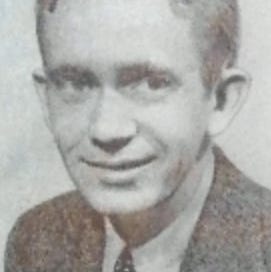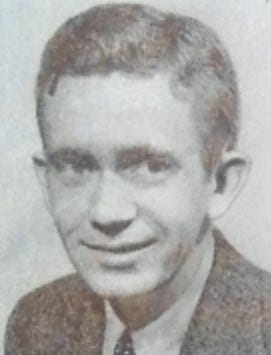Kenneth L. Dixon's tribute to the grunts
Kenneth L. Dixon’s dispatches from the war left no need for interpretation when it came to his point of view. The story he told was almost invariably that of the grunt on the front lines.
Writing from Rome on June 7, 1944, Dixon’s entire piece read as a conversation between “well-to-do Romans,” newly liberated, and an exasperated, parenthetical narrator who had spent months with the liberators.
“You have been so long,” sighed the beautiful, smartly dressed woman in the bar. “Waiting has been an ordeal — more than you can imagine. We have expected you since September.”
(Yes, lady, the lads have been delayed. There was a short delay at Salerno. You may have heard of Salerno — a lot of folks back home have; they were told in little telegrams.)
The piece ends with an anonymous soldier taking in this and other tone-deaf complaints from the locals while “sitting wearily on the curb, resting his burning feet.”
Amazement was written all over his dirty, bearded face. “Great God! The war has never touched some of them here, has it?”
Then he got up, shouldered his gun and pack again, and started slowly on through the town, on beyond Rome.
Kenneth Lee Dixon was born April 3, 1915 near Colchester, Illinois. After high school, he enrolled at Western Illinois State Teachers College in nearby Macomb and later taught at schools in the area. He also began working part time at the Macomb Daily Journal, and would eventually give up teaching to make journalism his career.
After growing up and spending his young adult years in the same general geographic area, Dixon would spend the rest of his life traveling. He moved to New Mexico in 1937 and worked as an editor at newspapers in Hobbs and Carlsbad in the pre-war years, and had a rare byline in the Carlsbad Current-Argus two days after the Pearl Harbor attacks, surveying heightened security at critical industries in the region.
Dixon reportedly tried to join the Army Air Corps but was turned down, so he shifted his attention to getting as close to the war as he could as a journalist. In June 1942 he left New Mexico to join the Associated Press staff in Washington, and he finally arrived at the front lines about 15 months later, spending a couple of weeks in North Africa before landing in Italy.
Though he would go on to report from all battlefields all over Europe after the Allies landed in Normandy, his Italian experience resonated with him for years. That may have been because it was his first prolonged exposure to the fighting — and more importantly the men doing the fighting — or perhaps it was fueled by the grinding, seemingly never-ending nature of the campaign.
Like every other AP correspondent, Dixon did his share of spot news reporting and daily battle updates. But he excelled at conversational pieces, often using the anonymous everyman soldier device to convey the mood on the ground as in the Rome dispatch above. Dixon eventually began writing columns from the front that appeared under a special “With the AEF” header in many newspapers back home.
Dixon was in Germany when the war in Europe ended, and he flew home to Washington in July 1945 with plans to move on and cover the fight against Japan after a brief respite. He eventually would report from the Pacific later that fall, but the war was over by then.
While V-J Day spawned countless celebratory counts from all corners of the country and globe, Dixon’s thoughts drifted to the men he had known who hadn’t come home. He wrote about them in an Aug. 15 piece filed from Washington:
It’s too bad the dead can’t dance.
This is the day and night to celebrate, to dance, to throw confetti and honk horns, to be joyful.
Victory is here — and more than that, peace.
This is the day and night that Sandy and Wendell and Joe and Jimmy were looking forward to. This is going to be their day and night. They knew how it would be. And it’s that way.
They were going to throw confetti and kiss blonds, brunettes and redheads (especially redheads, Sandy used to say) and thumb their noses at captains and lieutenant colonels today and tonight.
They were going to buy their wives, or sweethearts (that’s a concession to Sandy, who was single) orchids and hire a taxi for the night and just raise merry hell.
I hope they are celebrating, but I don’t know.
For Sandy lies south of San Pietro in a little graveyard just west of a junction in the road beyond Venafro. And Wendell lies at Anzio — “biggest little graveyard in the world” they called it. And Joe was the kid who drew his cross in the Vosge hills (southern France, it was). Jimmy’s swift and efficient soldier’s burial came in the Ardennes breakthrough.
They were all good kids.
The piece concluded with an exhortation to the soldiers and sailors who remained:
You’ve got a lot of celebrating to do, this victory day.
You’ve got to fill in for a quarter-million or more of the best of your buddies who aren’t here to celebrate.
For the dead can’t dance.





